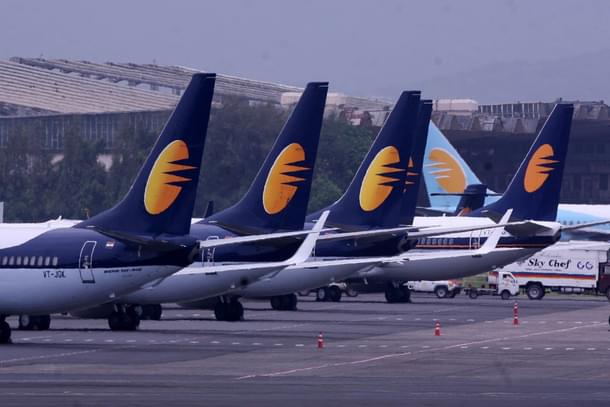Business
Death By Delay: Warning Signals Flash For Jet And Essar Steel’s IBC Process
R Jagannathan
Jan 17, 2019, 11:36 AM | Updated 11:36 AM IST
Save & read from anywhere!
Bookmark stories for easy access on any device or the Swarajya app.


Two stories, both relating to floundering companies, Jet Airways and Essar Steel, underline an important Indian failing where we let things drift to the point where huge losses for everyone concerned are the only outcome.
The story in Essar Steel is that State Bank of India (SBI) has put its Rs 15,431 crore loan on the block, as it is impatient with the endless processes of the insolvency court, the National Company Law Tribunal. Clearly, it believes that Arcelor Mittal, the preferred final bidder, is nowhere near the finishing line for the acquisition of Essar.
In the Jet Airways case, The Economic Times reports that Etihad, the junior equity partner to Naresh Goyal, has set very tough conditions to bail out the floundering airline: a share price of no more than Rs 150 (against a current market price of Rs 260 at mid-morning on 17 January), the complete exit of Goyal, no open offer, and no guarantees to banks on outstanding loans. In other words, Etihad knows it is buying a sinking ship, and is not planning to make things easy for either banks or Goyal.
Etihad should know. In April 2013, the airline bought a 24 per cent state in the airline at a 31.7 per cent premium to the market price of around Rs 573 a share, which means it paid around Rs 750-and-odd for it. The current market price is a third of that, and Etihad is playing hardball because it knows that purchasing Jet means bringing in even more capital to prevent it from collapsing.
The ET report quotes an SBI update of 15 January saying that the airline faces “the imminent risk of the grounding of aircraft by lessors, thereby triggering a rapid cessation of operations… Further, the business is unable to fund continuing operations from the end of this week, without immediate and substantial additional funding.”
There are actually only two ways to avoid a Jet crashing into oblivion. One is to allow foreign airlines to take up a majority stake in the airline, though even 49 per cent is good enough to directly or indirectly control the company – as the telecom industry showed when the same foreign investment limit applied to it. The other is to let the lenders take a haircut after taking over the entire Goyal shareholding of 51 per cent that cannot be worth more than Rs 850 crore, assuming the Etihad valuation is closer to reality. For an airline with a negative net worth of over Rs 7,000 crore, accumulated losses of Rs 10,700 crore, and debt of over Rs 8,000 crore, the right price for Goyal’s shares may well be a nominal Re 1.
Once Goyal is out, the lenders can try and find a new promoter, who is willing to take on the liabilities at the lowest possible additional haircut. The third option, of course, is to send Jet to the NCLT, where the outcomes can be even more uncertain and prone to delays.
In the Essar Steel case, SBI has indicated that it is frustrated by a process where even after 500 days of effort, the issue is unresolved and no money is received. The bank has indicated that it is willing to accept minimum cash payment of Rs 9,588 crore for its Rs 15,431 crore dues, when the NCLT process would have fetched nearly Rs 2,000 crore more.
The lesson for all Indians to learn – government, lenders, and even promoters – is that time is money.
If an insolvency resolution is incomplete even after 500 days, when the law says 270 is the outer limit, it is a warning signal that the Insolvency and Bankruptcy Code (IBC) could go the way of two previous efforts at rescuing sinking companies – the Sick Industrial Companies Act, and Debt Recovery Tribunals.
Delay also means that the price a bidder is willing to pay when the outlook for the industry looked good may come down if the resolution actually happens when the industry is turning bearish. JSW Steel, says one news report, may pull out of bidding for Uttam Value and Uttam Metaliks since the steel industry’s fortunes are getting cloudier. This is exactly what the SBI effort to sell of its loans at deeper haircuts outside the bankruptcy process suggests: it wants out before a possible pullout by Arcelor if the process takes even longer and the industry outlook worsens.
In the case of Jet, Goyal and his lenders have dragged the process of his exit for so long that the more possible outcome today is a shutdown of operations a la Kingfisher.
The time value of money is the first thing one learns in financial analysis. But cognitive psychologists and decision theorists have established that humans are more fearful of losses than they are happy with equivalent gains. This could be one reason why losers are unwilling to cut their losses when there is still time. It’s a pity that these simple lessons are not learnt by anyone.
Jagannathan is former Editorial Director, Swarajya. He tweets at @TheJaggi.





